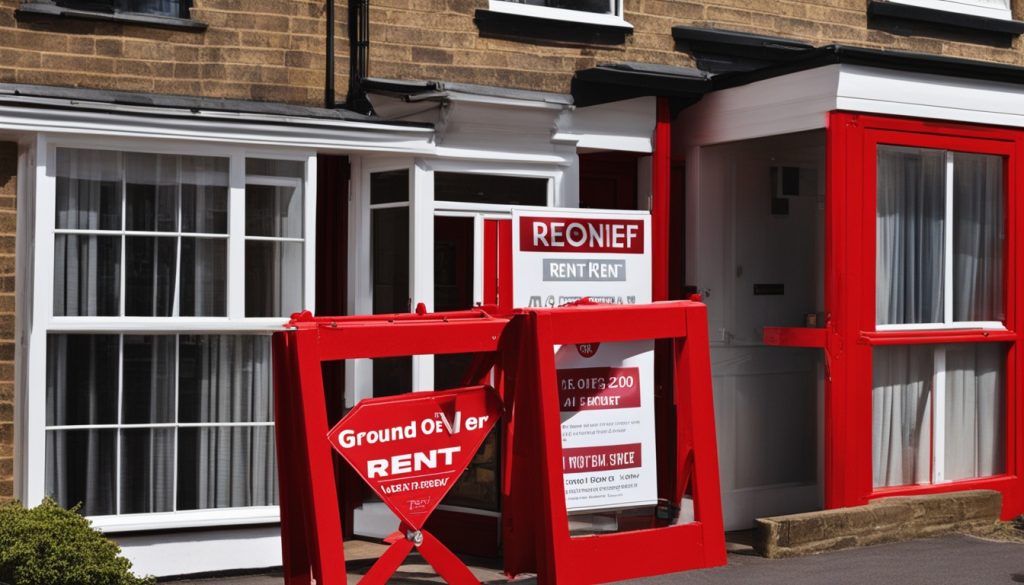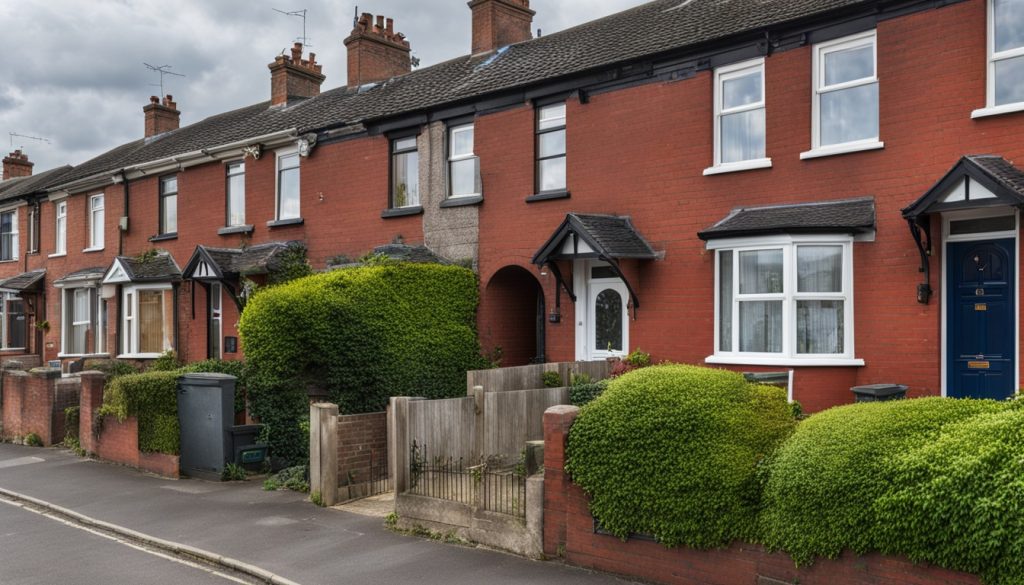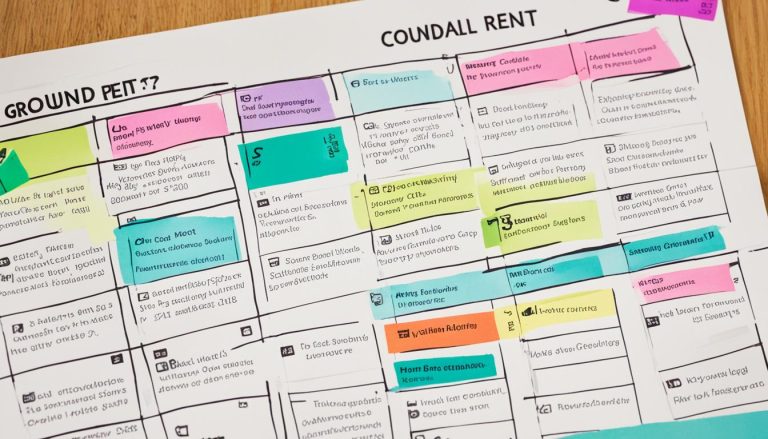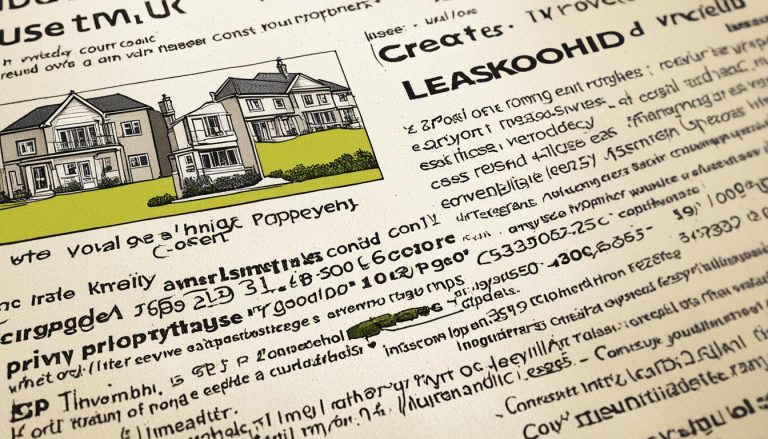Did you know 1 in 4 UK leasehold property owners face ground rent charges over £250 yearly? This number shows how many buyers might face problems with such flats. Leasehold Property Specialist Jason Grimster explains the risks. He helps you understand the issues with high ground rent. This knowledge will guide you in making a smart property decision.
Having a ground rent of more than £250 can bring serious problems. It can make you more likely to be evicted. It can also make the property hard to sell. If you fall behind on your ground rent payment by 3 months, the landlord can take the property back. This is according to the Housing Act 1988, Ground 8. Moreover, getting a mortgage or selling such a property is tough because lenders avoid these deals.
Understanding Ground Rent Over £250
If your ground rent is over £250 per annum, you could encounter serious problems. High ground rent charges pose significant threats for leasehold properties. They affect property ownership and can hinder your ability to get buy-to-let investment.
What Happens When Ground Rent Exceeds £250
When your ground rent exceeds £250 (or £1000 in London) and you’re 3 months late on payments, problems arise. Your landlord can, under the Housing Act 1988, repossess your home. This repossession is outside the Court’s control, and you must return the property.
The Risks of Falling into Arrears
If you owe 3 months of ground rent on a property where the rent is over £250, you’re at risk. The landlord can take back the property under the Housing Act, without a court’s approval. This could lead to eviction, which is a significant threat.
Mortgage Lenders’ Stance on High Ground Rents
Lenders are unlikely to lend on properties with ground rents that exceed £250 or double over time. Obtaining a mortgage or refinancing your home could become challenging. Selling a property with high ground rent might also pose difficulties.

Should I Buy a Flat With Ground Rent Over £250?
Buying a flat with high ground rent over £250 isn’t just about cost. It could lead to long-term problems. These include the risk of falling behind on payments. If you can’t keep up, you might lose your home. Plus, getting a mortgage or selling the flat later can be hard. The steep ground rent could even make the flat impossible to sell, tying you down.
Assessing the Long-Term Implications
A ground rent over £250 can really hurt the flat’s value. This makes it tough for you or any future buyers to get a mortgage. Big banks and lenders are wary of flats with such high ground rents. This reduces the number of people who might want to buy it. It basically lowers the flat’s worth and its marketability.
Considering Resale Value and Mortgage Eligibility
If a flat’s ground rent is over £250, it can really hit the resale value hard. This makes getting a mortgage, for you or future buyers, a big challenge. Most lenders avoid properties with such high ground rents. This means fewer people can buy it. So, even if you find the perfect buyer, they might not get a mortgage. This leaves you and the flat stuck.

Exploring Solutions for High Ground Rent
An Act has been put into place to help with ground rent over £250. This new rule only covers leases made after 30th June 2022. If your lease began before then, you might still be dealing with high ground rent problems.
Obtaining a Deed of Variation
To tackle ground rent over £250, getting a deed of variation (DoV) is the main approach. This contract lets you adjust the lease terms. For example, you might lower the ground rent or get rid of it altogether. You and your landlord both need to agree on the changes in the DoV for it to work.
The Process and Costs Involved
Getting a DoV for high ground rent isn’t easy or cheap. It could cost a lot in legal fees and need many talks with the freeholder. You need to think about the time and money you’ll put in before choosing this path.

Leasehold Properties and Ground Rent Scandals
The problem is with ground rent over £250 on leasehold properties. Many freeholders are not playing fair. Some won’t extend leases while others charge a lot for it. This leaves homeowners in a tough spot.
Controversial Practices and Lease Extensions
Freeholders often say no to extending leases. If they agree, the costs can be sky-high. This makes keeping a home hard for leaseholders. It’s a tricky situation with a big financial impact.
The Debate Around Leasehold Reform
The talk is on about fixing high ground rent and leasehold issues. People want better rules to protect those who own leases. They think ground rent fees should be lower. And extending leases should be easier and cheaper for people.
Getting leasehold law right is a big deal for lawmakers and those who help consumers. They say a big change is needed to help everyone involved. The goal is a system that’s fair to those who own the properties.
Weighing the Pros and Cons
Thinking about buying a flat with ground rent over £250 needs careful thought. While it might cost less at first, challenges like arrears, mortgage issues, and low resale value can be big problems later on. It’s key to look at the long-term risks of leasehold properties and expensive ground rent.
Balancing Affordability and Long-Term Risks
A cheaper flat may be attractive, but a high ground rent of over £250 could lead to serious issues. If you fall behind, your landlord might repossess the property, putting you at risk of eviction. It also makes getting or changing a mortgage hard, which affects your future options and value.
Think deeply about the effects this high ground rent could have on your finances. Are the savings at the start really worth it considering these risks?
Seeking Professional Advice
Dealing with ground rent over £250 in leasehold flats is complex. Talking to a solicitor or property specialist can be very helpful. They’ll shed light on the risks, discuss solutions like a deed of variation, and help you make a smart choice. Their knowledge on leasehold issues and reforms can guide you through the decision-making process.

Conclusion
Buying a flat with ground rent over £250 in the UK can be risky. Serious long-term effects may follow. The high ground rent can make selling the property hard. It can also put you at eviction risk and limit your mortgage options.
Though there are ways to address this like a deed of variation, these paths can be difficult and expensive. It’s key to think hard about the good and bad points of buying such a property. While it may be cheap in the short-run, getting a mortgage later and selling it could be tough.
Because of the complex nature of leasehold properties and ground rent issues, including the ongoing debate on leasehold reform, seeking expert advice is wise. A solicitor or property specialist can guide you. They will help you understand the options and figure out if buying a flat with high ground rent is right for you.
FAQ
How do lenders view properties with ground rent over £250?
Lenders shy away from properties with high ground rent. This makes it hard to get a mortgage, remortgage, or sell if yours is over £250. The same applies to doubling ground rent.
How does high ground rent impact the resale value and mortgage eligibility of a property?
Ground rent over £250 can drastically lower a property’s resale value. It also makes getting a mortgage tough. Future buyers might face the same problem, making the flat hard to sell.
Does the Ground Rent Act help with the issues of ground rent over £250?
The Ground Rent Act aims to solve high ground rent issues, but for new leases after 30th June 2022. If your lease started before, you might still face the problems of high ground rent.
What are the broader issues surrounding leasehold properties and ground rent?
Ground rent issues over £250 highlight wider concerns in leasehold. These include problems with extending leases or high extension costs, which can trap homeowners.
What are the calls for leasehold reform in the UK?
The debate for leasehold reform wants greater protection for leaseholders. This includes measures to limit ground rent and make extending leases easier and cheaper.






